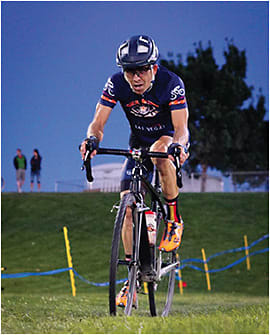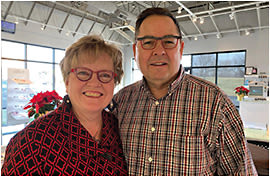
Plano sports eyewear is a breeze. More challenging, however, is meeting the visual and sports-specific requirements of Rx wearers.
Here, we speak to two eyecare professionals who represent different points of entry into the category. One focuses mostly on the needs of active cyclists, while the other addresses the over-50 athlete whose requirements often include progressive addition lenses.
Passion For Cycling
Optician Mike Hileman owns Eye Gear Sports Optics in the Summerlin community of Las Vegas. Talk about location, location, location.

“I share a parking lot with Las Vegas Cyclery, Sportif Chiropractic, and Power 360 Personal Training,” he says. The entire complex is Platinum and Gold LEED certified by Green Business Certification Inc.
While Hileman carries product for many sports, his specialty is cycling. A typical customer is 35-plus, “a professional who’s also interested in sports and living a healthy lifestyle,” he explains.
He carries a handful of Rx-compatible sports eyewear brands in his 1,500-square-foot location. The mix? About 80% Rx and 20% plano.
As for brands, “Mostly Oakley, but also Rudy Project and Wiley X are my preferred brands for minimal contact sports and recreation, whereas Liberty Rec Specs goggle styles are preferred for contact sports and young children,” Hileman notes.
Offerings + Challenges
Hileman doesn’t offer packages per se but explains to customers that all orders include premium scratch, UV, and anti-glare coatings. As he says, “If they’re not interested in these, they’re likely in the wrong store.”
His material of choice? “I mostly prefer Trivex over polycarbonate for the optical clarity upgrade,” he says.
It’s challenging, he adds, “to educate and explain the initial adjustment from flat frame Rx to compensated wrap profile Rx systems.” It can also be time-consuming. “Shooting typically requires the most time in choosing the right frame (minimal for least obstruction) and covering different tint options for the type of shooting.”
His biggest success? “I’ve had great response to the many versions of ‘Amethyst’ or purple in Transitions and fixed solid tints of varying darkness.”
A Different Clientele
If Hileman’s Summerlin community of Las Vegas appears a likely location for sports eyewear, Kansas City, MO, seems less so. That hasn’t, however, stopped Rand and Janeel Smith at eyeSmith Sport & Fashion Optical, along with their six opticians, from building a booming business.

“With our eight sports eyewear vendors, approximately 30% of our inventory in our 1,400-square-foot showroom is for sports,” explains Rand Smith. “If ECPs are truly going to be in the sports business, they must invest in plenty of inventory for that segment. More than 80% of our inventory of sports eyewear is Rxable,” he adds.
Old Versus Young
The eyeSmith Sport & Fashion Optical clientele isn’t your typical sports enthusiast, however. “They primarily wear progressive lenses and are over age 50,” explains Smith.
One plus? “The more mature demographic is accustomed to spending money on premium golf clubs, firearms, bicycles, etcetera,” he says. “Therefore, premium sports eyewear to enhance performance is viewed as an essential investment.”
The Lens Link
How does Smith select the right lens for each wearer? “If the sports brand has its own proprietary lenses, we use those,” he says.
“Otherwise,” Smith adds, “owing to its light weight, scratch resistance, super optics, and safety properties, we use Hoya’s Phoenix material with EX3+ antireflective treatment extensively. This gives the consumer unsurpassed vision, hydrophobic and oleophobic properties, and a two-year unlimited scratch warranty.”
What does Smith take into consideration with lenses for sports? “We configure the lens design with regard to color, optical properties, wrap optimizations, multifocal placement, etcetera, according to the particular sport.”
Pricing Parameters
While PALs are a specialty, the practice caters to all ages. “To help parents, we give students half price on lenses for sports glasses,” he explains. “That package price comes out to be about $350 for top-quality Phoenix lenses with EX3+ (with two-year unlimited scratch warranty) including the frame.”
That’s substantially less than most of his offerings. “Our other sports glasses average $525 to $1,100, depending on the frame and lens features,” explains Smith.
Whether it’s adults or children, he sees his responsibility as twofold. “Besides keeping their eyes safe,” concludes Smith, “our objective is to enhance performance by improving vision.” ![]()




